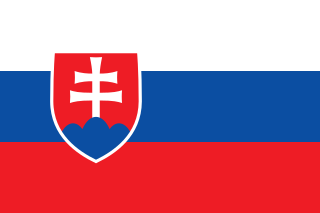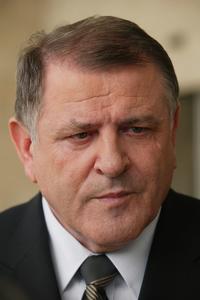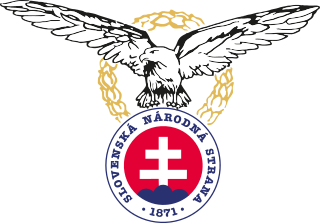| |||||
| Decades: | |||||
|---|---|---|---|---|---|
| See also: | Other events of 2009 History of Slovakia • Years | ||||
The following lists events that happened during 2009 in Slovakia .
| |||||
| Decades: | |||||
|---|---|---|---|---|---|
| See also: | Other events of 2009 History of Slovakia • Years | ||||
The following lists events that happened during 2009 in Slovakia .

Slovakia, officially the Slovak Republic, is a landlocked country in Central Europe. It is bordered by Poland to the north, Ukraine to the east, Hungary to the south, Austria to the west, and the Czech Republic to the northwest. Slovakia's mostly mountainous territory spans about 49,000 square kilometres (19,000 sq mi), hosting a population exceeding 5.4 million. The capital and largest city is Bratislava, while the second largest city is Košice.
Politics of Slovakia takes place in a framework of a parliamentary representative democratic republic, with a multi-party system. Legislative power is vested in the parliament and it can be exercised in some cases also by the government or directly by citizens.
The electoral threshold, or election threshold, is the minimum share of votes that a candidate or political party requires before they become entitled to representation or additional seats in a legislature.

Vladimír Mečiar is a Slovak former politician who served as the prime minister of Slovakia from June 1990 to May 1991, June 1992 to March 1994, and again from December 1994 to October 1998. He was the leader of the Movement for a Democratic Slovakia (HZDS), a populist party in Slovakia.

The Movement for a Democratic Slovakia, later known as the People's Party – Movement for a Democratic Slovakia, was a populist political party in Slovakia. The party is commonly considered as having been authoritarian and illiberal.

Direction – Social Democracy, also commonly referred to as Smer, is a left-wing nationalist and left-wing populist political party in Slovakia led by the incumbent prime minister Robert Fico. The party identifies as social-democratic, and was described as a combination of "leftist economics and nationalist appeal".

Ivan Gašparovič is a Slovak politician and lawyer who was the third president of Slovakia from 2004 to 2014. He was also the first and currently the only Slovak president to be re-elected.

The Slovakia national football team represents Slovakia in men's international football competition and it is governed by the Slovak Football Association (SFZ), the governing body for football in Slovakia. Slovakia's home stadium from 2019 is the reconstructed Tehelné pole in Bratislava. Historically, up to the split in 1993, the team participated mostly as Czechoslovakia, while it also competed as Slovakia during World War II.

The president of the Slovak Republic serves as the head of state of Slovakia and commander-in-chief of the Armed Forces. The people directly elect the president for five years, for a maximum of two consecutive terms. The presidency is essentially a ceremonial office, but the president exercises certain limited powers with absolute discretion. Their official residence is the Grassalkovich Palace in Bratislava.

The Slovak National Party is an ultranationalist political party in Slovakia. The party characterizes itself as a nationalist party based on both social and European Christian values.

The Bratislava Region is one of the administrative regions of Slovakia. Its capital is Bratislava. The region was first established in 1923 and its present borders exist from 1996. It is the smallest of the eight regions of Slovakia as well as the most urbanized, most developed and most productive by GDP per capita.
The Green Party, between October 1991 and January 2006 called the Green Party in Slovakia, was an environmentalist political party in Slovakia without parliamentary representation.

Miroslav Lajčák is a Slovak politician and diplomat, former Minister of Foreign Affairs of the Slovak Republic. In addition, Lajčák also served as President of the United Nations General Assembly for the 72nd session from 2017 until 2018.
Events from the year 2009 in the European Union.

The Conservative Democrats of Slovakia is a defunct Slovak political party established by four MPs who belonged to the Christian Democratic Movement, but left it on 21 February 2008 over disagreements with the party leader. The party was established in July 2008. The party was dissolved in 2014.

Freedom and Solidarity, also called Saska, is a centre-right liberal and libertarian political party in Slovakia. Established in 2009, SaS was founded by economist Richard Sulík, who designed Slovakia's flat tax system. It generally holds anti-state and neoliberal positions. After the 2020 Slovak parliamentary election, the party lost several seats in the National Council but became part of the coalition government with Ordinary People and Independent Personalities, For the People, and We Are Family. It is led by businessman Branislav Gröhling.

Most–Híd 2023 is an inter-ethnic political party in Slovakia. Its programme calls for greater cooperation between the country's Hungarian minority and ethnic Slovak majority. It was one of four parties in the Fico III government coalition, but lost all its seats in the National Council in the 2020 Slovak parliamentary election.

Maroš Šefčovič is a Slovak diplomat and politician serving as Executive Vice-President of the European Commission for the European Green Deal since 2023, as well as Vice-President of the European Commission for Interinstitutional Relations since 2019, previously holding the office from 2010 to 2014. He has been a member of the European Commission since 2009. Šefčovič also stood for office in the 2019 Slovak presidential election, which he lost against Zuzana Čaputová.

Peter Pellegrini is a Slovak politician who is serving as the sixth president of Slovakia since 2024. He previously served as prime minister of Slovakia from 2018 to 2020.

Progressive Slovakia is a liberal and social-liberal political party in Slovakia established in 2017. The party is led by Michal Šimečka, a former Vice President of the European Parliament. It is a member of the Renew Europe group and is a full member of the Alliance of Liberals and Democrats for Europe Party. PS currently has 6 MEPs: Ľudovít Ódor, Veronika Cifrová Ostrihoňová, Martin Hojsík, Michal Wiezik, Ľubica Karvašová, and Lucia Yar.